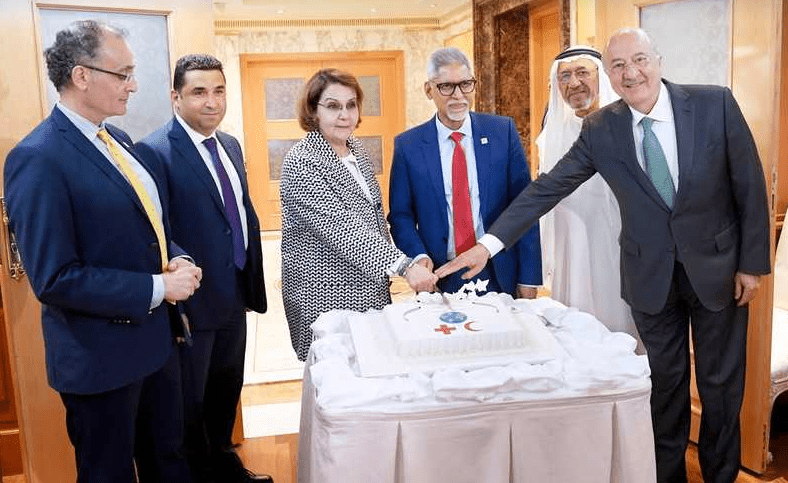The Secretary-General and CEO of the International Federation of the Red Cross and Red Crescent Societies, Jagan Chapagin, during his visit to Kuwait praised Kuwait’s continuous and endless support for the Federation and the afflicted countries, as well as its humanitarian and relief initiatives to support those affected by disasters and crises and affirmed the Federation’s desire to strengthen the strategic partnership with Kuwait in the area of humanitarian issues and raise it to a higher level of focus on the accelerating and growing crises and disasters around the world.
Chapagin told Al-Qabas the continuous coordination with Kuwait represented by the Kuwait Red Crescent Society, which he described as a “main partner”, to facilitate aid to Sudan and cooperate with the Sudanese Red Crescent Society but lamented the continuation of battles which hinder the aid and supplies to the Sudanese people.”
He pointed out that during his two-day visit to the country, he met many officials of the Kuwait Red Crescent Society and the Kuwaiti government, in addition to his meeting with officials of the Kuwait Fund for Arab Economic Development, and many global issues and humanitarian crises around the world were discussed, describing the talks and meetings with the Kuwaiti side as positive and fruitful. .
Chapagin added, “We had a really open and transparent discussion, and focused on uniting efforts and forces, to meet the humanitarian needs that are growing rapidly and dramatically,” considering that Kuwait’s contributions are very important, as no institution or government can respond to major global crises on its own. Therefore, our partnership with Kuwait is important, and it plays this role more and more every year, and we appreciate its humanitarian stance.
Regarding the situation in Sudan, he stressed that Kuwait spares no effort in providing aid, as the Kuwait Red Crescent Society has already recently sent planes loaded with medical and humanitarian aid to the Sudanese people, reiterating his appreciation for the distinguished humanitarian role played by Kuwait, hoping to continue this approach in a large way.
On the value of the material assistance provided by Kuwait to the union, he said, “This distinguished partnership between us cannot be measured by numbers and material value, but rather by its human value, as Kuwait’s geopolitical position plays an important role in the world. Therefore, our partnership is far from being based on material value, but rather on our distinguished relations.
Regarding the value of aid provided to the earthquake victims in Syria and Turkey, Chapagin stated that the amount collected is $650 million for Syria and Turkey, and we are still awaiting more financial aid for the two countries.
Regarding the mechanism for material aid reaching the beneficiaries in the affected countries, he stressed that the federation is working hard with full transparency to ensure that aid reaches those affected by global crises and disasters, especially after discovering that a number of cases do not receive our aid as it should.
Chapagin spoke about the efforts of the International Federation of Red Cross and Red Crescent Societies (IFSC) and its members around the world who are present in 192 countries and who are supported by nearly 17 million volunteers.
Chapagin spoke about the Union’s participation in the upcoming Cop28 Climate Summit, to be held in the UAE, stressing that the climate crisis is a priority for us, and we had a positive participation in the last summit held in Sharm El-Sheikh, where we launched a global platform to confront climate change, which aims to gather $1 billion to support communities most vulnerable to climate change.
He pointed out that the beneficiaries of the global platform for climate change are many, as they number about 250 million annually, and we helped 82 countries last year in facing medium and small disasters.
The most important challenges facing the federation are:
— The multiplicity of crises around the world
— Lack of material resources
— The challenges of climate change

